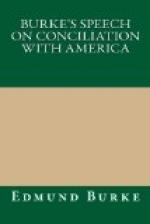[Footnote: 47. You deposed kings. What English kings have been deposed?]
[Footnote: 48. Lords Marchers. March, boundary. These lords were given permission by the English kings to take from the Welsh as much land as they could. They built their castles on the boundary line between the two countries, and when they were not quarrelling among themselves waged a guerilla warfare against the Welsh. The Lords Marchers, because of special privileges and the peculiar circumstances of their life, were virtually kings—petty kings, of course.]
[Footnote: 49. “When the clear star has shone upon the sailors, the troubled water flows down from the rocks, the winds fall, the clouds fade away, and, since they (Castor and Pollux) have so willed it, the threatening waves settle on the deep.”—Horace, Odes, I., 12, 27-32.]
[Footnote: 50. Opposuit natura. Nature opposed.]
[Footnote: 51. no theory. Select other instances of Burke’s impatience with fine-spun theories in statescraft]
[Footnote: 52. Republic of Plato Utopia
of More Ideal states
Consult the Century Dictionary]
[Footnote: 53.
“And
the dull swain
Treads daily on it with his clouted
shoon”
—MILTON’S
Comus, 6, 34, 35.]
[Footnote: 54. the year 1763 The date marks the beginning of the active struggle between England and the American colonies. The Stamp Act was the first definite step taken by the English Parliament in the attempt to tax the colonies without their consent.]
[Footnote: 55. legal competency. This had been practically recognized by Parliament prior to the passage of the Stamp Act. In Massachusetts the Colonial Assembly had made grants from year to year to the governor, both for his salary and the incidental expenses of his office. Notwithstanding the fact that he was appointed (in most cases) by the Crown, and invariably had the ear of the Lords of Trade, the colonies generally had things their own way and enjoyed a political freedom greater, perhaps, than did the people of England.]
[Footnote: 56. This is not my doctrine, but that of Ofellus; a rustic, yet unusually wise]
[Footnote: 57. Compare in point of style with 43, 22-25; 44, 1-6 In what way do such passages differ from Burke’s prevailng style? What is the central thought in each paragraph?]
[Footnote: 58. misguided people. There is little doubt that the colonists m many instances were misrepresented by the Lords of Trade and by the royal governors. See an interesting account of this in Fiske’s American Revolution.]
[Footnote: 59. an Act. Passed in 1767. It provided for a duty on imports, including tea, glass, and paper.]
[Footnote: 60 An Act. Boston Post Bill.]
[Footnote: 61. impartial administration of justice. This provided that if any person in Massachusetts were charged with murder, or any other capital offence, he should be tried either in some other colony or in Great Britain]




